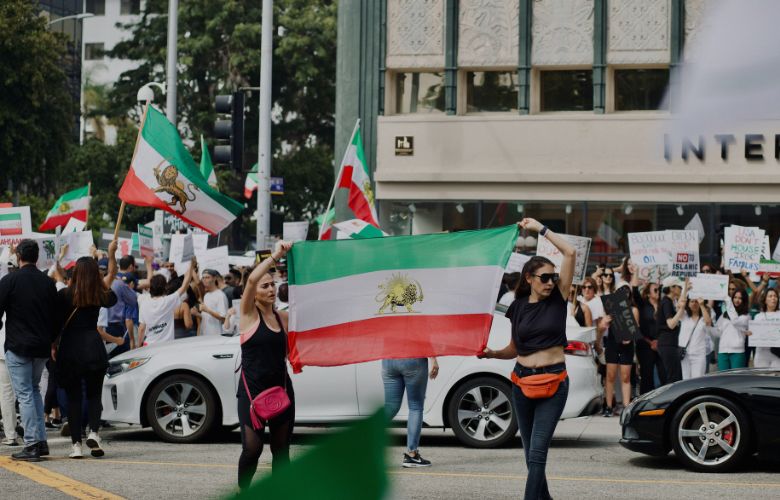
Bella Ciao, the Italian anti-fascist folk song has been revived in Iran, Ukraine, and Chile. The protest song has long been associated with resistance, and has most recently been adopted by women in Iran singing in defiance of laws that mean no woman is allowed to be without the head cover of a hijab, nor should they sing in public.
Translated to English, ‘Bella Ciao’ means ‘Goodbye Beautiful’. It is uncertain when Bella Ciao was actually composed, but Italian historians believe it is in keeping with the musical characteristics of northern folk music in the 19th Century. It is thought that it was sung by Mondina workers in the paddy fields in protest to the harsh working conditions, but is most widely associated with World War II when it was used by the Italian resistance. There are two lyrical versions of the song – the mondine version, and the partisan version. From WWII onwards, Bella Ciao has gone hand in hand with the message of resisting oppression, fascism, Nazism, and is often sung towards those who have the intention to harm others.
In Italian culture, the song has been consistently released by a number of pop artists through the years. Bella Ciao has also featured on a number of soundtracks internationally, sparking a renewed series of cover version releases. To date, there have been releases in an array of languages, including: Albanian, Arabic, Armenian, Belarusian, Bosnian, Breton, Bengali, Burmese, Catalan, Chinese, Croatian, Czech, Danish, English, Esperanto, Finnish, German, Greek, Hindi, Hungarian, Hebrew, Japanese, Kashmiri, Kurdish, Persian, Macedonian, Malayalam, Marathi, Norwegian, Occitan, Punjabi, Russian, Serbian, Slovak, Spanish, Syriac, Swedish, Tagalog, Tamil, Telugu, Thai, Tibetan, Turkish, Ukrainian and Yiddish.
In 2021, protesters against Benjamin ‘Bibi’ Netanyahu in Jerusalem sang Bibi Ciao as he left office as Prime Minister. Similarly, Iraqi protesters created their interpretation: Blaya Chara, which translates as ‘no way out’ as they rallied against the regime in 2019.
Most recently, the song has been sung by Ukrainians in protest of Russian invaders, as well as a symbol of defiance of various other incidents around the world from climate change to protesting against the state.
Its most notable insurgence is the online, viral activity in support of the women of Iran. The series of video protests singing Bella Ciao have been sparked by the murder of Mahsa Amini, who was 22 years old. Women began performing Persian versions of the song without the compulsory hijab as a defiant statement.
| Italian | English translation |
| Una mattina mi son svegliato, o bella ciao, bella ciao, bella ciao ciao ciao! Una mattina mi son svegliato e ho trovato l’invasor. O partigiano portami via, o bella ciao, bella ciao, bella ciao ciao ciao o partigiano portami via che mi sento di morir.E se io muoio da partigiano, o bella ciao, bella ciao, bella ciao ciao ciao, e se io muoio da partigiano tu mi devi seppellir.Seppellire lassù in montagna, o bella ciao, bella ciao, bella ciao ciao ciao, seppellire lassù in montagna sotto l’ombra di un bel fior. E le genti che passeranno, Questo è il fiore del partigiano, |
One morning I awakened, oh bella ciao, bella ciao, bella ciao, ciao, ciao! One morning I awakened And I found the invader. Oh partisan carry me away, oh bella ciao, bella ciao, bella ciao, ciao, ciao oh partisan carry me away Because I feel death approaching.And if I die as a partisan, oh bella ciao, bella ciao, bella ciao, ciao, ciao and if I die as a partisan then you must bury me.Bury me up in the mountain, oh bella ciao, bella ciao, bella ciao, ciao, ciao bury me up in the mountain under the shade of a beautiful flower. And all those who shall pass, This is the flower of the partisan, |
Accessibility At The Smith Center Series: Part One
James “Fitz” FitzSimmons Interview: The Boys In The Band On Netflix


Michelle is a musician and composer from the UK. She has performed across the UK and Europe and is passionate about arts education and opportunities for women and girls.
Read Full Profile© 2021 TheatreArtLife. All rights reserved.

Thank you so much for reading, but you have now reached your free article limit for this month.
Our contributors are currently writing more articles for you to enjoy.
To keep reading, all you have to do is become a subscriber and then you can read unlimited articles anytime.
Your investment will help us continue to ignite connections across the globe in live entertainment and build this community for industry professionals.